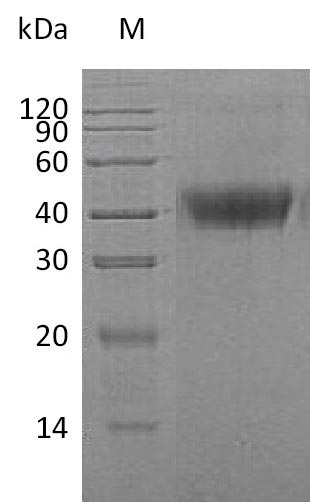Recombinant Human Macrophage colony-stimulating factor 1 (CSF1) is produced using a mammalian expression system and includes amino acids 33-255. The protein comes with a C-terminal 6xHis tag to make purification easier. It offers purity greater than 95% based on SDS-PAGE analysis and shows biological activity with an ED50 of less than 4.16 ng/ml in cell proliferation assays. Endotoxin levels stay below 1.0 EU/µg, which appears to make it suitable for sensitive research work.
CSF1 represents a key cytokine that regulates macrophage production, differentiation, and function. The protein plays what seems to be an essential role in immune responses and development of the mononuclear phagocyte system. Researchers commonly turn to CSF1 when studying hematopoiesis, immune system function, and related signaling pathways. This makes it a valuable tool for understanding cellular processes and disease mechanisms, though the complexity of these systems suggests there may be additional factors at play.
Potential Applications
Note: The applications listed below are based on what we know about this protein's biological functions, published research, and experience from experts in the field. However, we haven't fully tested all of these applications ourselves yet. We'd recommend running some preliminary tests first to make sure they work for your specific research goals.
1. Cell Proliferation and Viability Assays for Macrophage Research
This recombinant CSF1 is confirmed to be biologically active in mouse M-NFS-60 cells (ED₅₀ < 4.16 ng/ml) and suitable for proliferation assays. However, the partial sequence and C-terminal His-tag may alter potency or kinetics compared to full-length CSF1. Researchers should validate activity in human primary macrophages or other relevant cell types to ensure cross-species reactivity and assess whether the partial protein fully supports long-term survival and differentiation. The mammalian expression system likely preserves key PTMs, but dose-response curves should be established for each specific cell type
2. CSF1 Receptor Binding and Signaling Studies
The biologically active CSF1 can be used for binding studies, but the C-terminal His-tag may interfere with CSF1R interactions if the tag sterically blocks binding sites or affects dimerization. Signaling studies (e.g., MAPK, AKT pathways) should compare results with tag-free or full-length CSF1 to ensure physiological relevance. The mammalian expression supports native-like PTMs, but the partial sequence might truncate domains involved in receptor clustering or signaling amplitude.
3. Antibody Development and Validation
This mammalian-expressed CSF1 serves as a good antigen due to likely proper PTMs, but the partial sequence may generate antibodies with limited epitope coverage (e.g., missing N-terminal epitopes). Antibodies should be validated against full-length, native CSF1 from human sources (e.g., macrophage-conditioned media) to ensure recognition of all functional domains. The His-tag could induce tag-specific antibodies, so screening should include tag-free controls.
4. Protein-Protein Interaction Studies
The His-tag facilitates pull-down assays, but it may cause non-specific binding or mask interaction sites.- The partial sequence might miss interactions dependent on the full-length protein (e.g., with heparan sulfate proteoglycans or other modulators). Identified binding partners should be validated with full-length CSF1 to confirm biological relevance. The high purity minimizes contaminants, but the tag may require cleavage for accurate interaction mapping.
5. Preclinical Disease Model Studies
This human CSF1 can be used in animal models, but the partial sequence and species mismatch may reduce in vivo efficacy or induce immune responses. Researchers should validate that it recapitulates full-length CSF1 functions (e.g., macrophage recruitment, tissue repair) and consider using immunodeficient or humanized models to minimize xenogeneic reactions. The low endotoxin is suitable for in vivo use, but dose optimization is critical due to potential differences in pharmacokinetics.
Final Recommendation & Action Plan
This mammalian-expressed partial human CSF1 with a C-terminal His-tag is a valuable tool for in vitro studies due to its confirmed bioactivity and proper PTMs, but its partial nature and tag require validation for each application. Prioritize verifying that key functions (proliferation, signaling, interactions) match full-length CSF1 by including controls with native or tag-free protein. For cell-based assays, use the ED₅₀ as a starting point but optimize doses for human primary cells. When developing antibodies, ensure epitope coverage by testing against full-length CSF1. For in vivo studies, proceed cautiously with dose escalation and monitor for immunogenicity. The mammalian expression minimizes PTM concerns, but critical findings should be confirmed with full-length CSF1 when possible. Always include appropriate controls to account for tag-related artifacts or partial sequence limitations.






